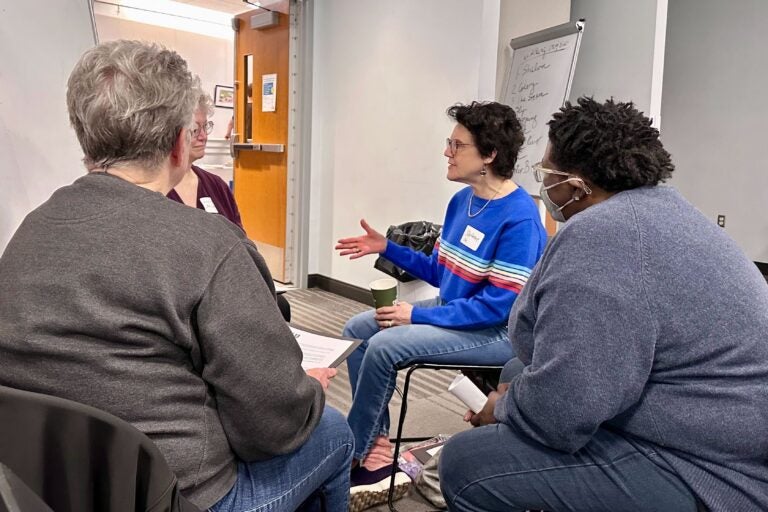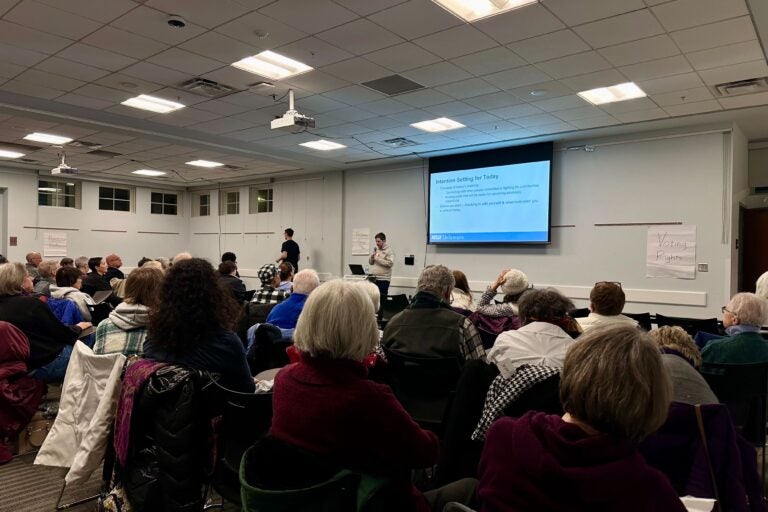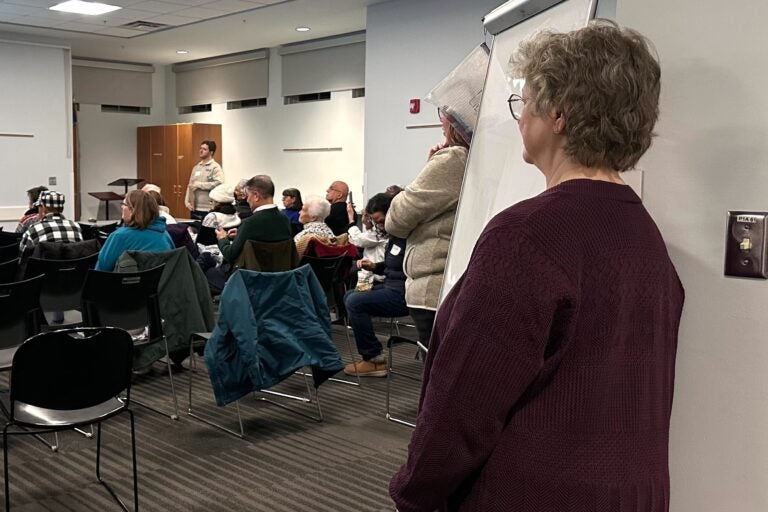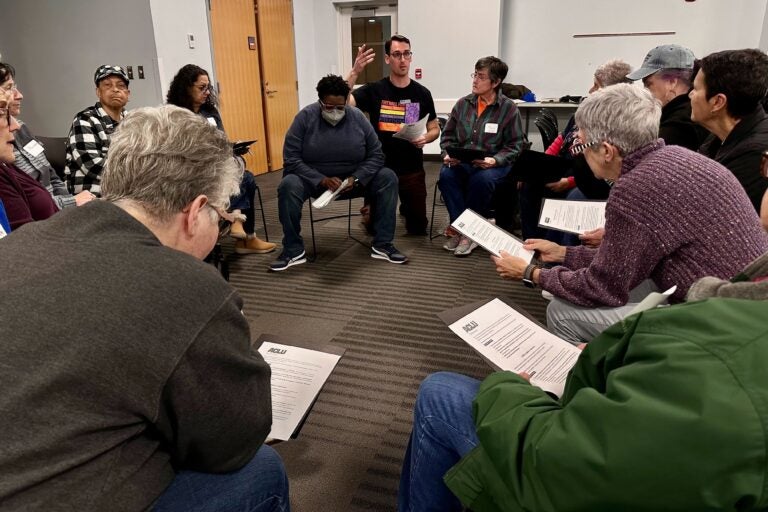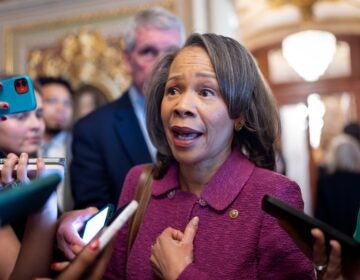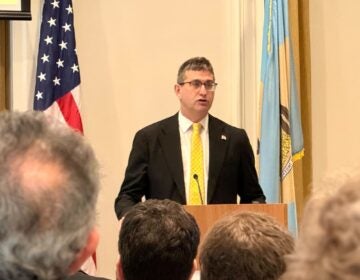Delaware ACLU trains activists to repel threats to immigrants, reproductive rights and LGBTQ+ protections under Trump
The state’s ACLU chapter hopes to prepare residents for potential policies under the incoming Trump administration.
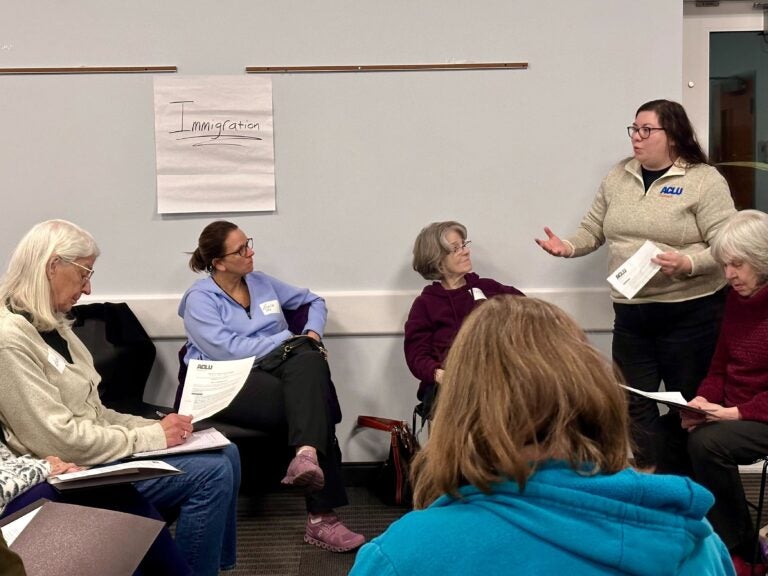
Participants at the Firewall for Freedom training session broke into groups to focus on key issues they’re passionate about, discussing threats, consequences and strategies for advocacy on topics like LGBTQ+ rights, reproductive freedom and immigration. (Johnny Perez-Gonzalez/WHYY)
From Philly and the Pa. suburbs to South Jersey and Delaware, what would you like WHYY News to cover? Let us know!
This story was supported by a statehouse coverage grant from the Corporation for Public Broadcasting.
Just days after President-elect Donald Trump’s first term started in 2017, there was a dramatic shift in policies away from how things had been done under President Barack Obama. Among those changes was a ban on people from six Muslim-majority countries from entering the United States.
Dubbed the “Muslim ban,” the executive order upended lives overnight and separated families. Subsequent immigration raids arrested hundreds and left many more living in fear of deportation. LGBTQ+ protections were rolled back, reproductive rights came under attack and the ripple effects left vulnerable groups reeling.
Now, as Trump returns to the White House, the American Civil Liberties Union of Delaware is determined to prevent history from repeating itself. Through their Firewall for Freedom initiative, they are advocating for stronger legal protections and equipping Delawareans with tools to lead the charge in defending civil rights.
“We knew there was a possibility that Donald Trump could get elected again,” said Mike Brickner, executive director of the ACLU of Delaware. “And so, we wanted to be as prepared as possible. States like Delaware that have elected officials who are concerned about civil rights, can actually take a stand and protect people who need that protection from the federal government.”
To meet this goal, the ACLU launched activist training sessions across Delaware’s three counties, designed to mobilize leaders and community members. These sessions teach participants how to advocate for policies, organize campaigns and engage legislators to defend vulnerable populations.
“Here in the state of Delaware, we have a forum for people to fill out to volunteer with the organization and just since the election of November we’ve had about 550 people that have filled that out,” Brickner said. “We’re really hearing where people want to take significant action to get protections in place, that they want to be in the places where decisions are being made, that they want to feel like that they are actually helping to change the laws.”
Held in Wilmington, Dover and Lewes, the sessions offer participants actionable tools to advocate effectively. Training topics include how to engage with legislators on key issues, organize grassroots campaigns to influence policy and educate their communities about rights and resources.
This coordinated approach is essential, Brickner said, for building long-term resilience.
“It’s really important for us to also win people’s hearts and minds out in the community, make legislative change, as well as get these wins in the courts. That’s what really makes these rights more durable,” he said.
“This isn’t just about resisting federal overreach. It’s about equipping people to make real, lasting change in their communities and ensuring these rights are durable.”
‘There’s a lot of fear’
The ACLU’s training sessions have drawn a diverse array of participants, many of whom voiced fears about what lies ahead.
The event at the Lewes Public Library offered attendees not just an opportunity to learn but also to practice advocacy. After lessons on the basics, participants were split into small groups to focus on five key topics: reproductive freedom, probation reform, voting rights, immigration and LGBTQ+ rights. These breakout sessions allowed them to refine their storytelling skills and practice presenting their concerns to legislators in mock sessions.
One attendee, Leslie Vincent, a retired Delaware Technical Community College professor and queer woman, shared her anxieties about the future. Now living in Milton, Delaware, Vincent has been married to her wife for 10 years.
“There’s a lot of fear. I’m scared. I’m scared for myself. I’m scared … about my transgender niece and her partner,” Vincent said. “I’m scared for a whole lot of people. I’m scared for all of my former students who are immigrants. I’m scared for students who are disabled. I’m seeing cuts already in school districts to resources for disabled children.”
She emphasized the need to shore up state-level protections to prevent federal rollbacks.
“I firmly believe that they’re going to do everything they can to take our marriage rights away. People say it’s just a piece of paper. No, it’s not a piece of paper. There’s a whole lot of financial and legal things wrapped up in there that can’t be replicated just from wills and trusts,” Vincent said. “I need to know that if either of us needs to go into an assisted living facility, we’re not going to be actively discriminated against.”
Louise Ngido, a middle school teacher in the Cape Henlopen School District who also participated, spoke passionately about the impact of mass deportations on students and families. As someone who works at a school where almost half of the student body is either immigrants or the children of immigrants, she’s seen the fear gripping her community.
“I’m really concerned with the possibility of schools becoming places where [U.S. Immigration and Customs Enforcement] can enter and detain children. I find that very terrifying,” Ngido said. “Children should never be used as pawns … the school is not the place, [it] is not the venue. It is meant to terrorize parents and to terrorize children, but to terrorize parents even more through their children, I think is inhumane,”
It’s already hard assimilating to a new country, she said. She also drew attention to the importance of legislation protecting sensitive locations, such as schools, churches and hospitals, from immigration enforcement.
“My understanding is that no location will be off-limits anymore,” she said. “There used to be kind of safe havens — places you couldn’t touch, like a hospital, a school, [or] a church. Places that were sacred. That if ICE wanted to detain a person, they couldn’t do it at those locations. And I agree with that. I think there are certain sacred places, if you’re sick, you should be able to go to a hospital. My husband works at a hospital. That should be a safe space. You should be able to go and have a baby at a hospital and not worry about ICE taking you away or separating you from your child.”
The training sessions provided Vincent and Ngido a sense of solidarity and actionable resources.
“There are people very knowledgeable about these issues,” Ngido said. “The program helped me understand the rights of our children, our staff and what our roles can be. It’s a huge learning curve, but I’m committed to sharing what I’ve learned with my colleagues.”
Vincent, who had never approached a legislator before, admitted that stepping into advocacy was outside her comfort zone.
“Face to face is a lot harder for me,” she said. “But I’m willing to do it because it’s that important. If I can be a part of the thing that happens, I want to be.”
Drawing strength from the past
The ACLU’s experiences during Trump’s first presidency inform their current efforts. From deportations to the rollback of reproductive rights, the impacts were far-reaching and deeply felt.
“President Trump has pledged that from day one, he is going to ramp up mass deportation plans,” Brickner said. “This could lead to millions of people being deported from the country. This could have a really terrible effect on businesses, on families, and on our greater communities here in the state of Delaware.”
The Firewall for Freedom initiative focuses on building state-level protections to counter these potential harms, including:
- Non-cooperation policies: Ensuring state agencies and local law enforcement don’t assist federal deportation operations.
- Safe spaces: Passing legislation to protect sensitive areas like schools, hospitals and churches from immigration enforcement.
- Reproductive shield laws: Protecting patients and providers from prosecution by other states.
“We were able to pass a law allowing advanced practice clinicians to perform abortions. We were also able to pass a law this past year allowing for Medicaid funding to support abortions.” he said. The laws eliminated barriers for those with Medicaid.
In 2022, Delaware also approved legislation that protects the health records of out-of-state patients seeking reproductive care in the state.
For LGBTQ+ communities, similar shield protections are being advanced for transgender individuals seeking gender-affirming care.
“Delaware is a state that generally protects those individuals and so we’re seeing more people coming to our state to receive health care because they are transgender,” he said. “We want to make sure that they and their providers are protected from other states or the federal government trying to investigate them or to criminalize them in some way.”
The ACLU of Delaware is clear in its mission to not just to defend against harmful federal policies, but to empower Delawareans to lead in advancing civil rights.
“While the federal government does have a large impact, we at the state can actually advance rights,” Brickner said. “We don’t have to just settle for preventing catastrophes. We can take the position of really advancing rights in the First State.”

Get daily updates from WHYY News!
WHYY is your source for fact-based, in-depth journalism and information. As a nonprofit organization, we rely on financial support from readers like you. Please give today.



